Turri, the Italian furniture brand, unveils three new Atelier furniture collections
by TurriJun 05, 2024
•make your fridays matter with a well-read weekend
by Aarthi MohanPublished on : Aug 04, 2025
Tracing Origins doesn’t start with a statement. Instead, it denotes a quiet return – to form, to material, to function. Ruya Akyol Studio’s debut furniture design collection, named so, was presented at this year's SaloneSatellite and marks a thoughtful entry into the world of furniture and spatial design, offering objects shaped by how we live today and informed by where we come from. For the Istanbul and Milan-based studio founded by product designer Ruya Akyol, design isn’t just about utility or expression, but a deliberate meeting of the two. Echoing this believe, the collection is confident in its sense of being and definition. It doesn’t chase attention, but holds it, offering a vision of contemporary living that is intuitive, grounded and deeply considered.
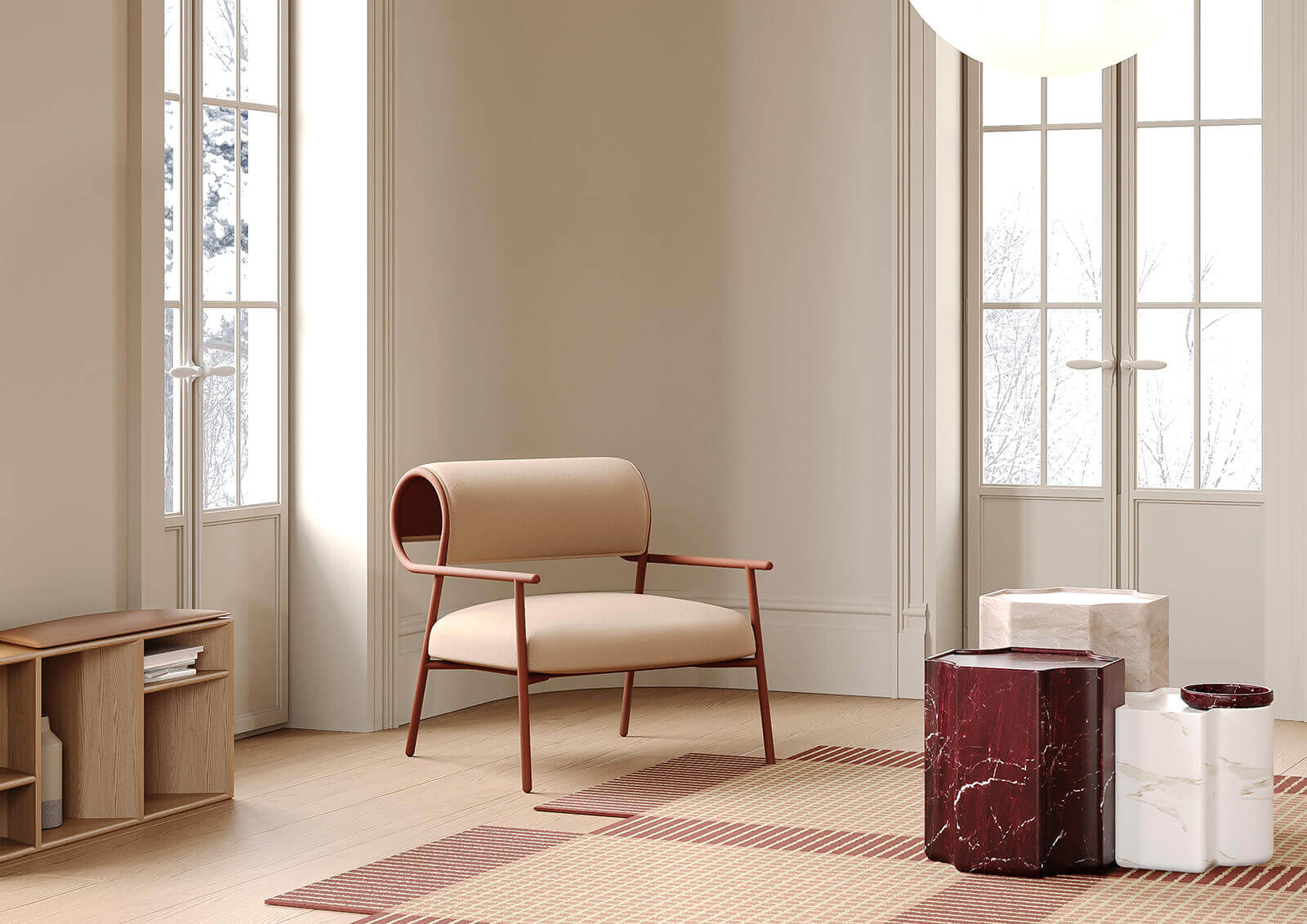
Each piece in the furniture ensemble is rooted in a modern understanding of how we live, where spaces do more than one thing, and the objects inhabiting them must follow suit. Primarily, beneath the function of the objects lies an undercurrent of history: "Deeply informed by the studio’s Anatolian heritage and Mediterranean sensibility, each piece reflects a commitment to craftsmanship, cultural memory and timeless design — reimagined through a contemporary lens,” the project’s press release notes.
At the centre of the collection is the Baia sofa. Designed as a complete system for modern living as opposed to just a seating element, it combines the comfort of a lounge with the versatility of a work surface. Baia acknowledges that today, the living room is also a workplace, a digital meeting point, a resting zone and a stage for everyday rituals. The sofa’s integrated desk flows naturally from its form, offering a place to work, think or set down a book, without interrupting the line of the design. Curved, sculptural and welcoming, the sofa design’s silhouette supports a wide range of postures and positions, whether curled up with a laptop or sprawled out in the quiet of the evening. Its alternating oak legs and precise joinery highlight an attention to craftsmanship that carries through to the entire collection. Upholstered in premium Italian fabrics, it combines tactility with endurance, built to last through whatever the home demands next.
That same clarity defines the Signe armchair, where inspiration comes from the movement of a single, fluid signature. Here, the idea is not about adding, but refining. A single metal pipe is bent and rotated to form the furniture's backrest, armrest and rear leg in one continuous gesture. There are no signs of excess, just a form that holds itself with ease and elegance. The near invisible support structure that stabilises the cushion is almost a metaphor for Signe itself: quiet, supportive and deliberate. Every part of the chair design is well-defined, and none overwhelms the whole.
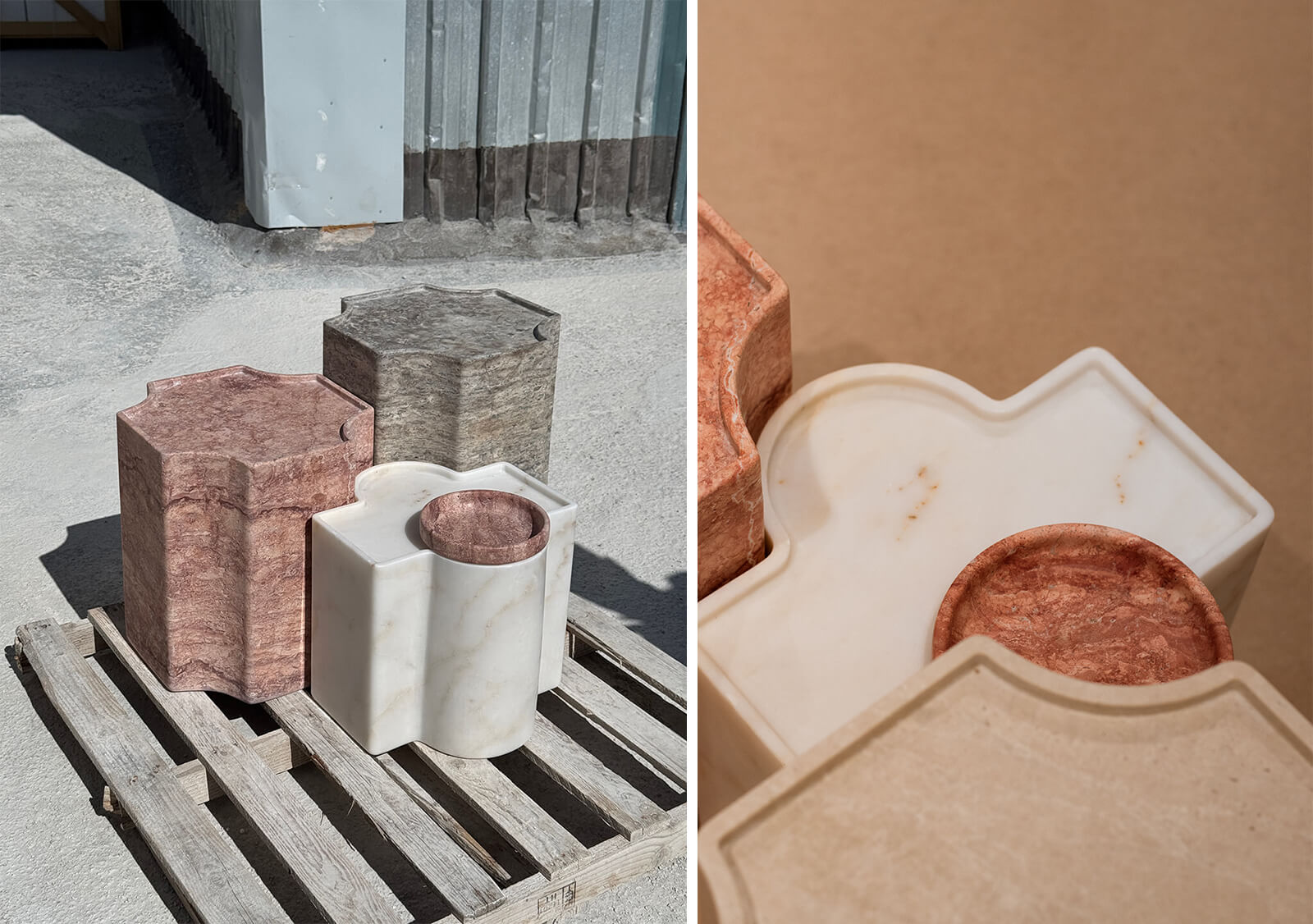
Geometry and ornament coalesce in the Desen coffee tables, which draw on patterns found in traditional Mediterranean tiling. Rather than simply mimicking historical motifs, the tables reframe them, extruded in stone to become functional objects with a sense of rhythm and weight. Varying in height and shape, they can be grouped in ways that shift and adapt to the room’s mood. The softly rounded base and recessed tops add both tactile appeal and practical stability, while their hollowed interiors reduce weight and make movement effortless. Each table design is made from locally sourced stone, reinforcing Ruya Akyol Studio’s dedication to sustainable production and material honesty.
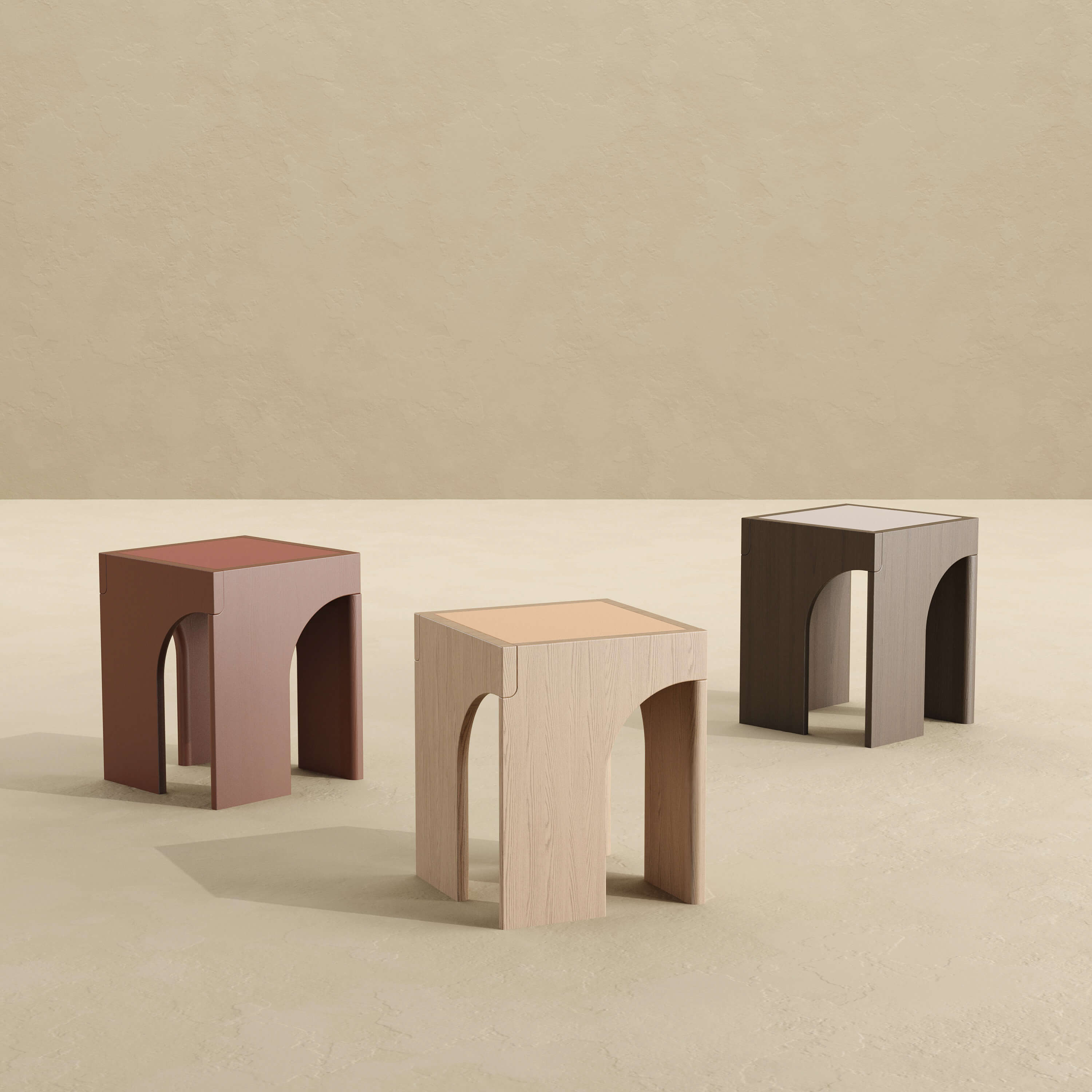
The Pasaj stool, named after the Turkish word for ‘passage’, finds its character in its distinctive flow. Its sculptural arc-shaped cutouts create visual and structural movement, while repeated and interlocking legs lend it strength and identity. Made entirely of solid wood and topped with a leather seat, the stool design combines simplicity and sensuality. Its inner curves are softly filleted – a small gesture that enhances both feel and form.
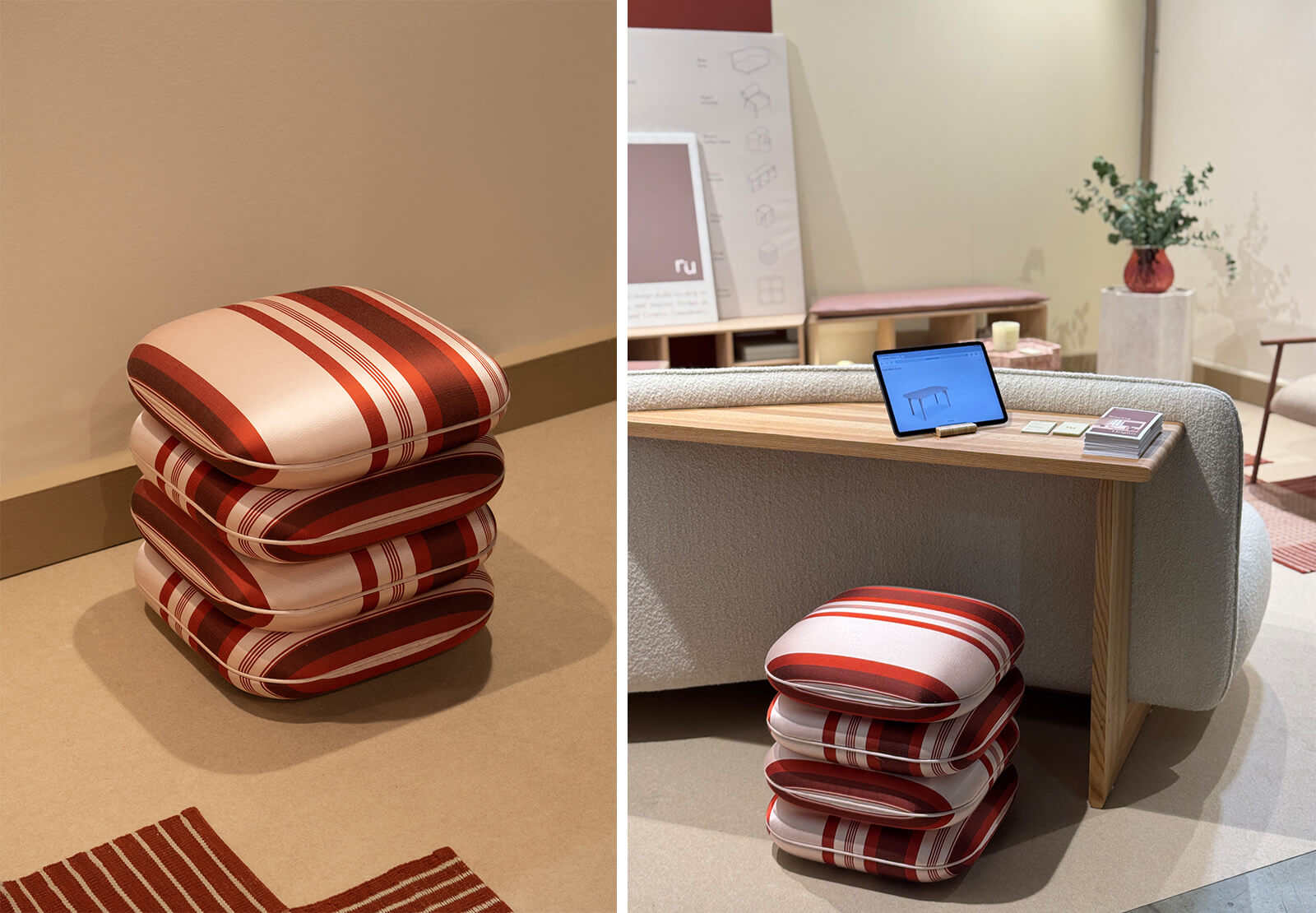
Where Pasaj channels structural rhythm, the Sedi pouf celebrates softness. Resembling four stacked cushions, Sedi is upholstered in striped fabric by KutniaKutnia, a textile brand from Gaziantep, Turkey, known for reviving traditional weaving techniques using natural fibres and dyes. Traditionally used for ceremonial garments and upholstery, the recently revived Kutnu fabric brings a layer of cultural memory to the collection, grounding its playful form in a deeper material history. Each line of the textile adds to the pouf's sculptural presence, while hidden wheels beneath the form allow it to move effortlessly through a space, bringing utility to its decorative charm.
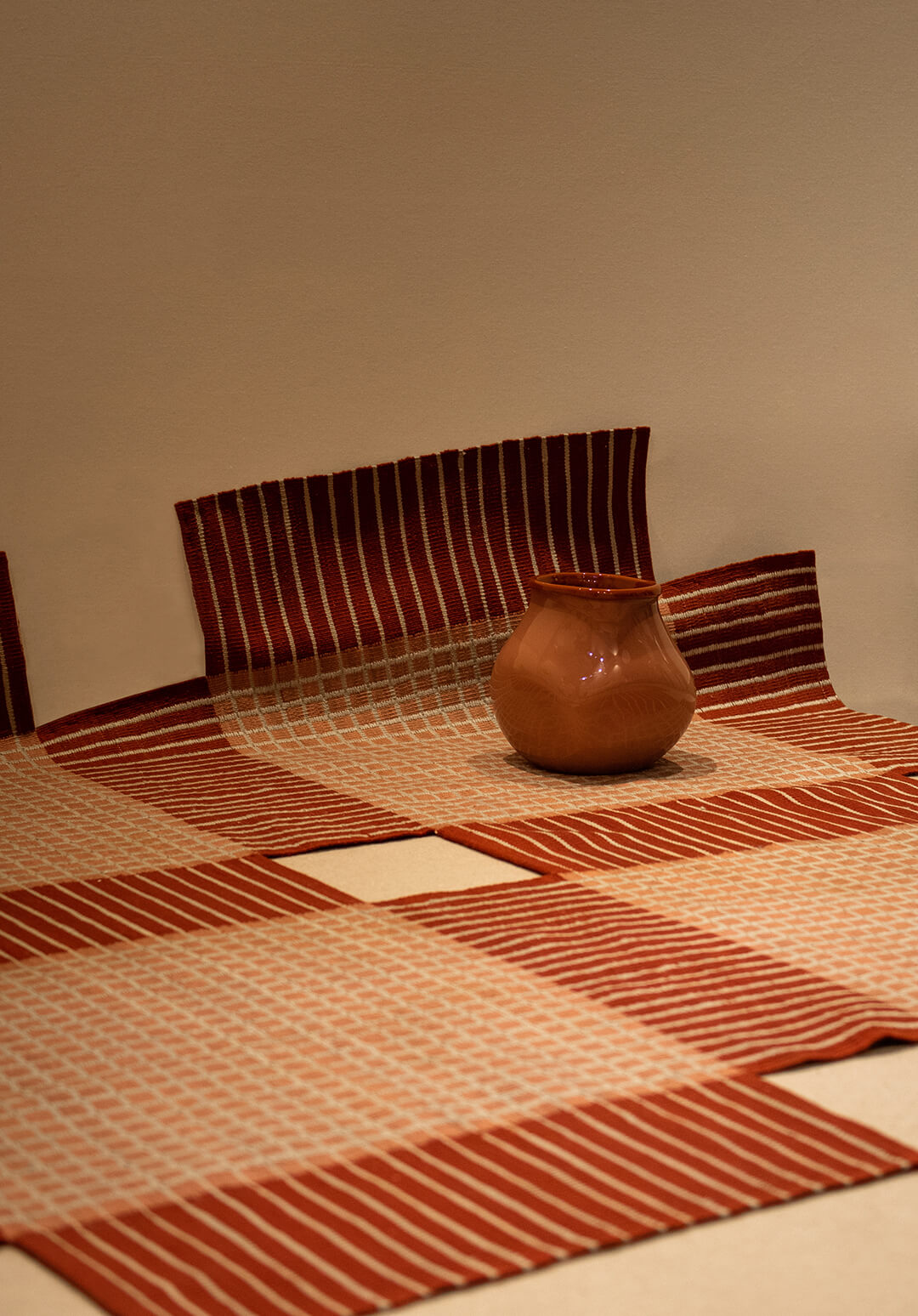
The Nazar carpet is equally expressive, drawing on form and folklore. Traditionally, the Nazar, an eye-shaped motif, appears in textiles and other objects of design and trinkets to ward off misfortune. Here, this motif is not used as a pattern, but as form itself. The carpet subsumes the symbol – a diamond shape divided into four, repeated and reinterpreted in a modern visual language. Handwoven from naturally dyed Anatolian wool, the carpet is as much a product of storytelling as it is of endearing craft. Made entirely by women artisans, it preserves generational knowledge while offering a fresh, contemporary design aesthetic.
Two quieter pieces round out the collection with clarity and composure. The Verto console, derived from the Latin word vertere, meaning ‘to turn’, uses repetition and rotation to create a modular storage system with visual cadence. Its inclined side panels and rounded column edge are precisely crafted using custom blades, resulting in a form that is both architecturally grounded and adaptable across uses. The Göz vase, by contrast, plays with volume at a smaller scale. Its name, meaning ‘eye’ in Turkish, hints at both a gaze and a presence. With a circular opening and grounded base, it anchors space through its simple geometry and sculptural restraint.
What ties this collection together is not simply a shared material palette or visual style, but a philosophy that design can be both purposeful and poetic. Akyol, who studied across Istanbul, Milan and Paris and worked closely with Italian architect and designer Claudio Bellini and French designer and architect Philippe Starck before founding her studio in Milan in 2021, brings a blend of industrial precision and cultural warmth to her work. Her product designs speak with intention and not indulgence. Her furniture debut, while modest in scale, nonetheless signals the arrival of a studio with a clear, intentional voice, rooted in craft, history and the realities of modern life.
by Chahna Tank Oct 15, 2025
Dutch ecological artist-designer and founder of Woven Studio speaks to STIR about the perceived impact of his work in an age of environmental crises and climate change.
by Bansari Paghdar Oct 14, 2025
In his solo show, the American artist and designer showcases handcrafted furniture, lighting and products made from salvaged leather, beeswax and sheepskin.
by Aarthi Mohan Oct 13, 2025
The edition—spotlighting the theme Past. Present. Possible.—hopes to turn the city into a living canvas for collaboration, discovery and reflection.
by Anushka Sharma Oct 11, 2025
The Italian design studio shares insights into their hybrid gallery-workshop, their fascination with fibreglass and the ritualistic forms of their objects.
 surprise me!
surprise me!
make your fridays matter
SUBSCRIBEEnter your details to sign in
Don’t have an account?
Sign upOr you can sign in with
a single account for all
STIR platforms
All your bookmarks will be available across all your devices.
Stay STIRred
Already have an account?
Sign inOr you can sign up with
Tap on things that interests you.
Select the Conversation Category you would like to watch
Please enter your details and click submit.
Enter the 6-digit code sent at
Verification link sent to check your inbox or spam folder to complete sign up process



by Aarthi Mohan | Published on : Aug 04, 2025
What do you think?